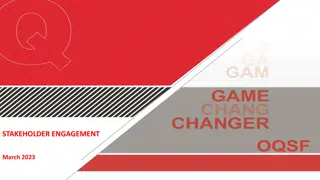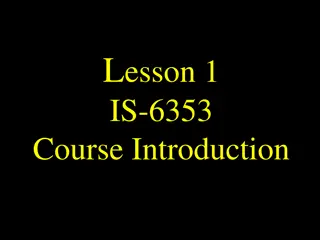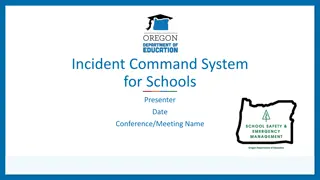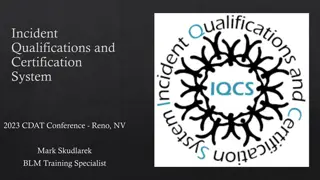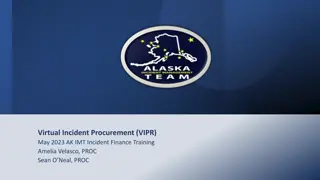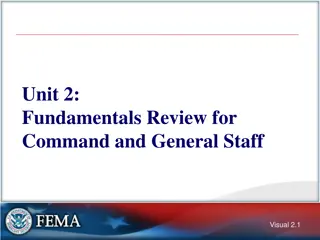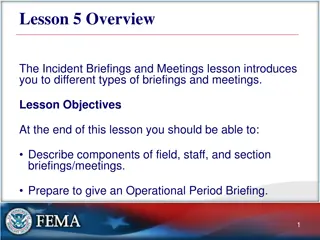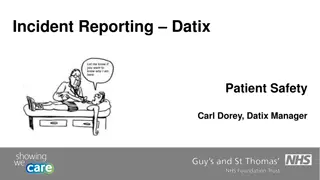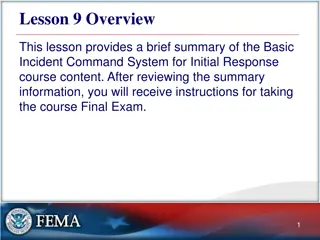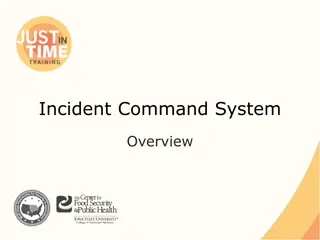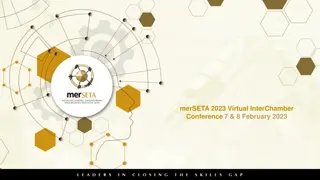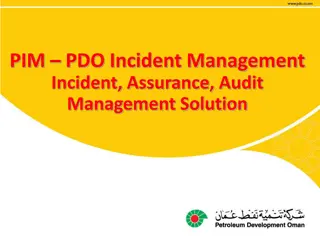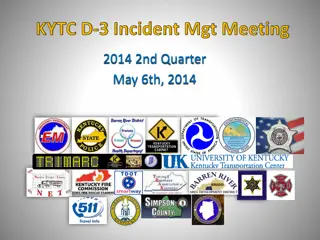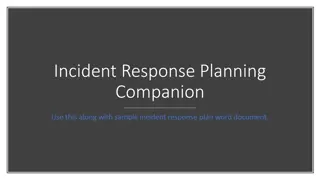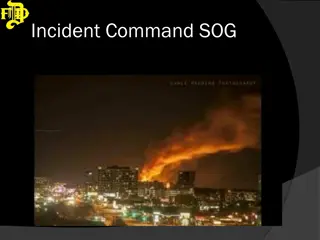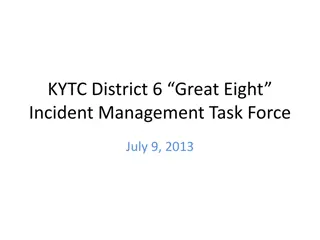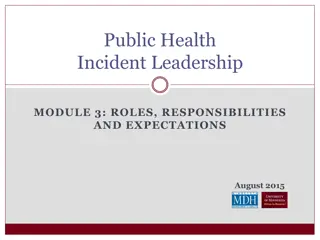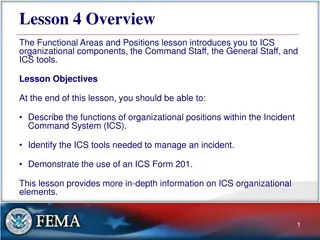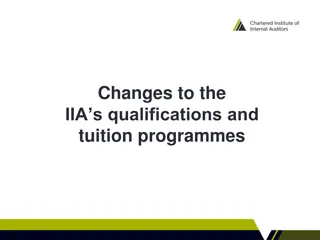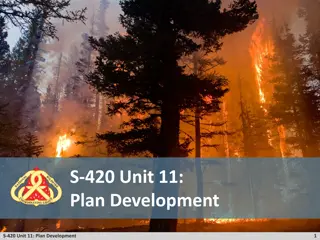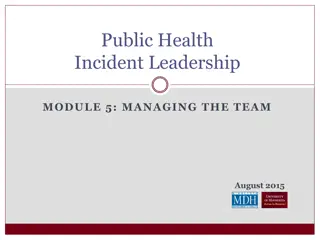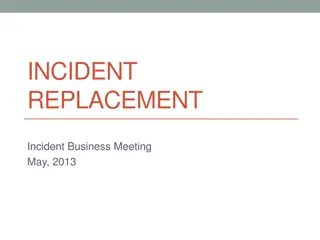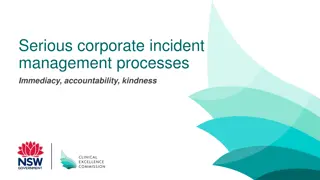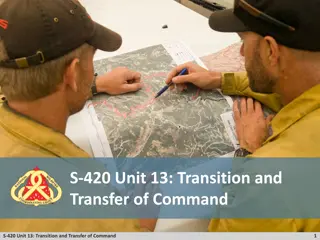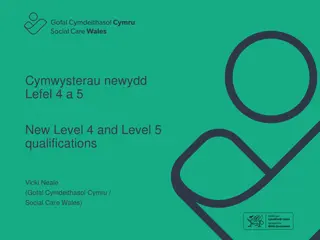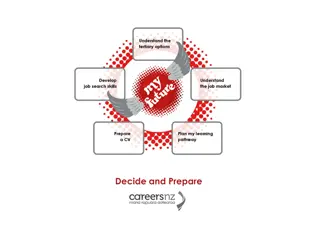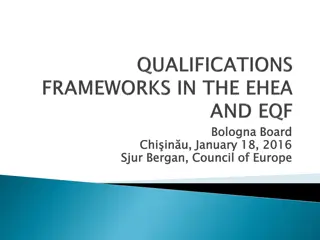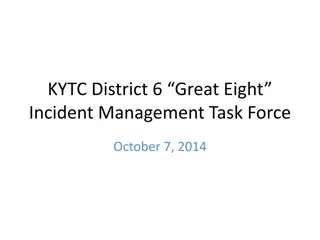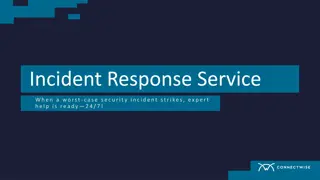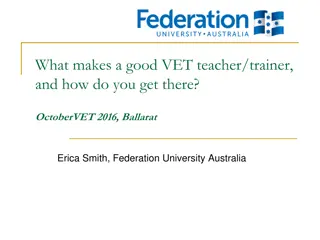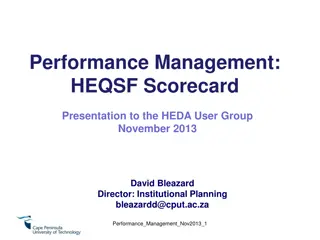Research into incident response
Blue Marble conducted research commissioned by Ofwat and CCW to understand customer experiences during the June 2023 water supply interruption in the South East Water region. The report aims to identify customer expectations, company responses, communication effectiveness, support provided, and area
1 views • 48 slides
Effective Incident Briefings and Meetings Overview
This lesson covers various types of briefings and meetings within the Incident Command System (ICS), including field, staff, and section briefings. It explores the Incident Action Planning Process for developing the IAP, emphasizing the importance of effective communication in incident management. T
0 views • 14 slides
National Qualifications Framework and Accreditation Process Overview
This content provides an in-depth look at the National Qualifications Framework (NQF) including various qualification types and levels. It also delves into the Accreditation Process for occupational qualifications, challenges faced, stakeholder engagement, and the stages applicants go through when s
2 views • 18 slides
Overview of UTSA's IS-6353 Incident Response Course
Introduction to the IS-6353 Incident Response course at UTSA covering topics such as course administration, information assurance, incident response, intrusion detection, and more. The course includes details on the schedule, grading criteria, required textbooks, and notable SQL injection breaches i
5 views • 47 slides
Comprehensive Overview of Incident Command System for Schools
This presentation provides a detailed insight into the Incident Command System (ICS) for schools, outlining its purpose, structure, key concepts, and how individuals can fit into an ICS during emergencies. Topics covered include coordination with community partners, the importance of ICS, its struct
2 views • 16 slides
IQCS and Incident Qualifications: Enhancing Certification Systems
The Incident Qualifications and Certification System (IQCS) plays a crucial role in the training and certification of responders in various agencies and organizations. Started in 2004, IQCS has evolved to include interagency cooperation and standardized course delivery. The system ensures that respo
2 views • 20 slides
Understanding Virtual Incident Procurement (VIPR) in Government Agencies
Virtual Incident Procurement (VIPR) is a web-based system used by the United States Department of Agriculture, Forest Service (USDA-FS) for incident procurement. It includes Incident Blanket Purchase Agreements (I-BPA) that allow Contracting Officers to create, award, and manage solicitation and agr
3 views • 37 slides
Understanding the Patient Safety Incident Response Framework (PSIRF)
The Patient Safety Incident Response Framework (PSIRF) is set to replace the Serious Incident Framework (2015) within the NHS, marking a significant shift in responding to patient safety incidents. Its key aims include compassionate engagement, system-based learning, proportionate responses, and sup
5 views • 9 slides
Incident Management Fundamentals and Command Structure Review
Explore key NIMS doctrine concepts, agency policies, incident complexity factors, and Unified Command functions in managing complex incidents or events. Learn about Incident Action Planning, transfer of command, and the roles of Command and General Staff positions. Gain insights into incident comple
0 views • 11 slides
Incident Briefings and Meetings: Overview and Best Practices
This lesson covers various types of briefings and meetings within the Incident Command System (ICS), such as field, staff, and section briefings. Learn how to prepare and conduct operational period briefings effectively, understand the Incident Action Planning Process, and master the art of deliveri
2 views • 14 slides
Understanding Incident Reporting in Healthcare
Incident reporting in healthcare is crucial for patient safety and organizational improvement. An incident can encompass a wide range of events that cause or have the potential to cause harm, loss, or damage. Reporting incidents, including near misses, allows for learning from both mistakes and succ
0 views • 10 slides
Basic Incident Command System Overview
This lesson provides a summary of the Basic Incident Command System for Initial Response course content. It covers the NIMS framework, ICS management systems, incident command structure, unity of command, communication protocols, delegation of authority, and management by objectives. Understanding t
5 views • 15 slides
Incident Command System Overview and Structure
Incident Command System (ICS) provides a standardized approach to incident management. It offers flexibility, adaptability, and efficient management for incidents of varying sizes and complexities. ICS consists of top-down structure with key functions like logistics, operations, planning, finance/ad
1 views • 22 slides
merSETA 2023 Virtual InterChamber Conference Overview
In the merSETA 2023 Virtual InterChamber Conference, key focus areas included the status of occupational qualifications development, learning material development, and implementation challenges and successes. Notably, progress was made in aligning qualifications, re-submitting qualifications for reg
1 views • 9 slides
Automatic Recognition of Higher Education Qualifications Treaty Summary
Importance of automatic recognition of qualifications in higher education has been emphasized, leading to initiatives like the Treaty on Automatic Recognition of Higher Education Qualifications by Baltic and Benelux states. This treaty aims to enhance mutual trust, transparent recognition, and contr
1 views • 8 slides
Upgrade Highlights: Incident and Action Modules Enhancements
Explore the latest upgrades in the incident and action modules, including improved navigation, enhanced access controls, workflow changes, and new feature implementations like transportation consequences. Stay updated on the revamped Incident Management and Audit Solutions for efficient incident han
0 views • 10 slides
ABSA Submission on National Qualifications Framework Amendment Bill
ABSA presented a submission on the National Qualifications Framework Amendment Bill regarding key matters such as processing times for qualification checks, third-party suppliers, and notification of fraudulent results. They expressed concerns about the verification process timelines and the impact
0 views • 6 slides
KYTC.D-3 Incident Management Meeting 2nd Quarter May 6th, 2014
The KYTC.D-3 Incident Management Meeting for the 2nd quarter of 2014 held on May 6th discussed various topics including recent incidents, emergency plans, construction projects, spill cleanup, and upcoming training opportunities. Detailed incidents such as crashes and fires on I-65 and Nunn Pkwy wer
0 views • 24 slides
Cyber Incident Response Planning and Team Organization
This comprehensive incident response planning companion provides guidelines for creating effective policies and plans, emphasizing the importance of customization to suit each agency's unique circumstances. It outlines the purpose, objectives, and structure of an incident response plan, along with t
0 views • 16 slides
Incident Command Structure and Span of Control Overview
Incident Command Structure helps in managing incidents effectively by utilizing ICS terminology and levels as needed. The flexibility within ICS allows for structuring incidents correctly based on individual needs. Understanding the Span of Control is crucial for supervisors to manage the number of
2 views • 24 slides
KYTC District 6 Great Eight Incident Management Task Force Meeting Recap
Recap of the KYTC District 6 Great Eight Incident Management Task Force meeting held on July 9, 2013. The meeting covered incident reviews including a truck fire and fuel spill in Harrison County, responsibilities for debris removal after a truck/camper crash in Carroll County, a two semi crash in G
0 views • 44 slides
Public Health Incident Leadership: Roles, Responsibilities, and Expectations
Explore the positions, responsibilities, and expectations within the Incident Command System in public health incidents. Learn about the Incident Commander's role, the need for timely decision-making, and the structure of the Incident Command System. Understand the importance of common processes and
0 views • 37 slides
Understanding Incident Command System (ICS) Organizational Components
This lesson introduces the key components of the Incident Command System (ICS), including the Command Staff, General Staff, and essential tools. It covers the roles of the Incident Commander, Deputy Incident Commander, and Command Staff positions, emphasizing their functions in managing incidents ef
0 views • 40 slides
Changes to IIA Qualifications and Tuition Programmes
The International Internal Auditors (IIA) is making changes to its qualifications and tuition programmes, phasing out the IIA Diploma and introducing the Certified Internal Auditor (CIA) and Qualification in Internal Audit Leadership (QIAL). Transition arrangements are in place for current students,
1 views • 14 slides
Incident Management Plan Development Process Overview
The incident management plan development process involves activities such as preparation for tactics meeting, conducting the tactics meeting, and preparing for the planning meeting. The tactics meeting is crucial for breaking down overall incident objectives into tactical assignments for the next op
0 views • 8 slides
Effective Management of Public Health Incidents: Objectives and Team Leadership
Learn the importance of distinguishing between management objectives and incident objectives, linking objectives to response activities, and leading an Incident Management Team through the Planning P process. Explore the difference between general management objectives and operational incident objec
0 views • 28 slides
Lessons Learned from Roanoke City Health Department's Active Shooter Incident
Roanoke City Health Department faced a threat of an active shooter in 2016. The incident prompted immediate response actions, including mobilizing an incident command team and enhancing security measures. Transitional responses involved state-level collaboration for investigation and operational sec
0 views • 10 slides
Impact of Pre-University Qualifications on Success in Science: A-Level Chemistry Study
Examining the influence of pre-university qualifications, particularly A-level Chemistry, on success in interdisciplinary science fields. The study explores the predictors of success, including the role of mathematics, across various science subjects and discusses the outcomes of students with and w
0 views • 10 slides
Incident Replacement Procedures and Guidelines in Business Meetings
Explore the process of incident replacement in business meetings, including who needs replacement items, approval authorities, and necessary forms to complete. Reference materials such as the IIBMH handbook and NWCG guidelines provide detailed insights into managing incidents effectively. Understand
0 views • 25 slides
Corporate Incident Management Processes and Policy Update
Explore the corporate incident management processes and policy updates focusing on immediacy, accountability, and kindness. Learn about incidents, harm scores, and revised process steps outlined by the Clinical Excellence Commission and NSW Health. Discover the differences between the current and re
0 views • 17 slides
Transition and Transfer of Incident Command
Ensuring effective transition and transfer of incident command is crucial for incident management. This involves activities such as demobilization planning, transfer of command planning, incident package creation, and more. Detailed plans need to be in place to facilitate a smooth handover of author
0 views • 12 slides
Qualification Framework in Social Care Wales
The Social Care Wales Qualification Framework outlines Level 4 and Level 5 qualifications in social care, focusing on professional practice, leadership, and management. It provides structured training and development routes, raising standards and skills in the sector. The framework includes mandator
0 views • 8 slides
Understanding Tertiary Education Options in New Zealand
Explore the various qualifications, completion times, and providers in New Zealand's tertiary education system. Learn about the different levels of qualifications available, typical study durations, and where you can obtain these qualifications. Gain insights into the meaning of study and training,
0 views • 23 slides
The Bologna Process: Enhancing Qualifications Frameworks in Higher Education
The Bologna Process, initiated in 1999, aimed to establish a harmonized system of higher education qualifications across Europe. Key developments included the introduction of a three-tier degree structure, emphasis on recognition and mobility, and the adoption of a Qualifications Framework in 2005.
0 views • 7 slides
KYTC District 6 Incident Management Task Force Meeting Summary
The meeting of the KYTC District 6 Great Eight Incident Management Task Force on October 7, 2014, covered various incident reviews including the I-75 Brent Spence Bridge crash and an overturned semi on US 42. The meeting included introductions, approval of previous meeting minutes, and discussions o
0 views • 48 slides
ConnectWise Incident Response Service: Expert Help for Security Incidents
ConnectWise Incident Response Service offers expert assistance 24/7 for handling worst-case security incidents. Gain direct access to incident response analysts, real-time management, recovery procedures, insights on attacker tactics, and post-incident monitoring. Choose from flexible service option
0 views • 13 slides
Advancing Innovation in Qualifications: Challenges and Opportunities
Explore the journey towards innovation in qualifications led by Professor Ken Young, MTC Clare Rowntree, and other experts. Delve into the meaning of being capable, challenges faced, strategies for achieving innovation, and thought-provoking questions for discussion on the future of innovation in qu
0 views • 10 slides
Qualifications and Challenges of VET Teachers in Australia
Qualifications for VET teachers evolved from in-service degrees to Certificate IV level. Challenges include recruitment issues, lack of higher-level qualification evidence, and reluctance in supporting teacher qualifications by state governments and unions. Research aims to address quality problems
0 views • 32 slides
Understanding Qualifications for Church Leaders in Biblical Context
Exploring the biblical qualifications for church leaders outlined in 1 Timothy and Titus, emphasizing the importance of qualified leadership for the spiritual health and protection of the church. The background of these epistles and the differences in the churches they addressed provide insights int
0 views • 34 slides
CPUT Performance Management Scorecard for HEQSF Programme Development
CPUT is facing the challenge of aligning qualifications with the new HEQSF, requiring the development of about 200 new qualifications in the next five years. The Performance Management Scorecard is being used to track the progress of adapting qualifications to the HEQSF standards across different ca
0 views • 23 slides


